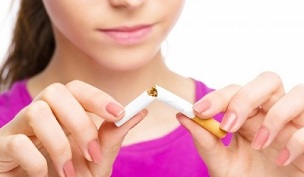
In the process of letting go of bad habits, the main thing is not to overdo it with setting and actualizing goals. Very few are able to quit smoking here once and for all. This is a long term process with its own bribes and experiences. All of this is linked to emotional, psychological and physiological characteristics. You can quit smoking on your own, but you need to do it correctly, reasonably, gradually.
Let's try to work out all the twists and turns in this important, but not easy, question. Experts have developed a formula for success for a person leaving an addiction, in the form of a timeline or a chart with a detailed description of the changes occurring in the body. I wonder what happens to the body when you stop smoking. Let's try to figure it out.
Important: the consequences for the body from day to day
During the transition to a healthy lifestyle, important clinical changes occur in the body of an adult (heavy smoker), the emotional background and physiological state change. Each new day of quitting smoking differs from the previous due to psychological and physical well-being issues. As they say, the main thing right now is not to break. So we will present a picture of what is happening in the form of a diary, in which a number of calendar days are noted and given with a description of the current symptoms.
Quit smoking: day one
When, finally, the decision to quit smoking is made definitively and irrevocably (but not for the first time), it is necessary to gradually "enter" into this process. To facilitate the transition from an unhealthy lifestyle to a healthy one, it is important to know how the body will behave. On the first day of the "course" of a healthy lifestyle, it is necessary for the weakened body to get used to a new diet for itself and begin the processes of recovery. The abrupt transition from one state to another can adversely affect overall well-being and reduce resolution. It is not only a physical test but also a psychological test.
The main thing that happens to the body when you stop smoking: the amount of carbon monoxide decreases, the transport of erythrocytes improves, and more oxygen enters the tissues. Even outwardly, the first day after quitting nicotine, the "old" smoker enjoys a new state for himself, he is more active, happy, confident in his own strength. The very ability to quit smoking painlessly on the first day of the course convinces the heavy smoker of determination and willpower. And this is important for overcoming nicotine cravings.
However, remember that on the first day characteristic physiological changes begin in the body.
For example, what's going on in a woman's body:
- slight dizziness,
- lack of appetite,
- weakness,
- anxiety,
- sleep disturbances,
- insomnia.

What is the reason? An experienced smoker subjects his body to emotional-psychological and physiological tests. Such deep processes are set in motion that the body "cannot live" without nicotine.
Quitting a cigarette triggers other dramatic changes. Nicotine is not simply absorbed into the bloodstream, but begins to affect the bloodstream. Therefore, it is important to consider that, in general, the body will need at least a year to recover from stopping smoking. But for now, back to the quit smoking journal.
Remember that on the first day of quitting smoking, characteristic physiological changes begin in the body, for example, women experience slight dizziness.
Quit smoking: second day
At this point, the decision may let you down a bit - the attacks will start to revert to the old habit (at least not for a long time). This is what happens in a man's body, for example. As the struggle unfolds on an emotional level, the body undergoes no less dramatic changes: the respiratory organs are cleared of mucus and sedimentation components, the functions of the ciliated epithelium are restored, the state of the gastrointestinal tract. gut improves, new cells appear in the tissues. The changes occurring during this period at the emotional level are manifested in the form of euphoria, emotional excitability. But irritability can also appear. It all depends on self-hypnosis and self-discipline. Although sometimes drowsiness can be suddenly replaced by energy. On the second day after quitting, the appetite is not yet fully recovered (strange taste sensations may occur). You may also experience shortness of breath, cough, and even stomach pain. During this period, urges to urinate and difficulty falling asleep occur more often. If you add to this nervous tension, for example, due to stress at work, then it is quite natural for itching on the skin.
Smoking cessation: days three and four
Let's take a closer look at what happens to the body when you stop smoking. A number of factors influence how quickly the body will recover. In particular, the general condition and the weakening of immunity play a special role. Therefore, the nuances of smoking cessation therapy must be judged at the cellular level. Each person has their own internal energy supply to fight addiction. Accordingly, an individual approach is necessary. During the cleansing process, the body gets rid of toxins. Even the structure of cells changes to trigger radical cleansing.
Here's what's happening to the body these days:
- restoration of the ciliated epithelium on the tissues of the respiratory organs,
- in the pancreas, the indicator of alkaline fractions increases,
- less mucus builds up in the stomach,
- In general, blood circulation in the heart and brain improves.
A clear reluctance to smoke begins to appear, peristalsis is normalized. At the same time, the "withdrawal" of the ex-smoker intensifies, which has more psychological implications, nervousness appears. Quit smoking as if “there is no place”, struggling with a long-term habit. Against this background, there is an increased appetite, "grabbing" sweets. Sometimes the skin begins to peel off and the fingers swell. When coughing, phlegm may appear in the throat.
Quitting smoking: five and six days
In the process of "quitting", many people use a special table or calendar for convenience, someone keeps a diary, recording their feelings in detail. This is useful when you need to identify associated symptoms and changes in the body. As it gets easier after a few days, a journal will help you to remember and analyze your mistakes. From the fifth to the seventh day, a former smoker notices the following changes in his body: we notice how the skin microtraumas have started to heal faster; all segments of the respiratory system are restored (and the most distant too); digestion returns to normal; at an invisible level, blood cells are freed from nicotine.

Usually the end point of the addiction process is set on the seventh day, when a person's physical addiction to cigarettes (smoke, smell) goes away. At the same time, there is no feeling of psychological discomfort. But do not forget about the likelihood of relapse. Disturbances happen anyway. When the euphoria passes, nervousness and aggression appear. Even sleep problems can reappear. However, it is important to remember that it is not for long that the main stage of life - quitting smoking - has been successfully completed and there is no motivation to return to smoking. old life.
In the process of "quitting", many people use a special table or calendar for convenience, someone keeps a diary, recording their feelings in detail.
Quit smoking: week two
After a week it seems the Rubicon has passed and now you can live like non-smokers, calmly engaging in the daily worries. But this rarely happens. The body has certainly taken a big leap in the first week of quitting smoking. Nevertheless, sometimes even external factors (the smoke of cigarettes and even their appearance, for example when they smoke nearby) can play a bad joke with a former smoker. Therefore, it is worth sharing your plans with friends and acquaintances, so that there is no temptation to break up "for the company".
It's worth listening to your body right now, it has probably already managed to wean itself off the nicotine. But this is not the end of the body's process of restoring nicotine addiction. You can help yourself by flipping through a former smoker's calendar, seeing obvious changes in the work on yourself. It turns out that from the second week the struggle turns into a purely psychological plane. The urge to smoke can occur during stress, sadness, at the sight of an active smoker at work. We must learn not to react to such outward promises of returning to the past.
What happens at the end of the second week?
In the past 14 days, a former smoker abstains from nicotine addiction. At that time, the following changes in her body can be noted: healing of bronchitis and renewal of platelets. Although the renewal of red blood cells has not yet taken place. This may be due to vegetative-vascular manifestations. At the same time, you can see how the complexion improves, the yellowish tint of the fingers disappears, and the sharp cough gradually disappears. The longer the smoker's experience, the longer the symptoms will appear.
What happens the first month after quitting smoking?
On the 30th day of stopping smoking, the weight begins to decrease, the upper respiratory system is fully restored, and psychological comfort is felt. At the same time, enthusiasm can be replaced by depression or the blues. Then again, as in the first week, it is important not to run wild, to hang on, because the hardest way to quit smoking has already passed.
What happens after the second month of stopping smoking?
From the second month of the recovery process from nicotine addiction, and for the next three to four months, the ex-smoker (this is especially noticeable in women) acquires more pleasing facial features, puffiness disappears and the grayish tint of the face disappears, as well as rosacea mosquito nets. And in the third month, an intensive restoration of blood vessels occurs in the body. This indicates that the tone of the body is finally returning to normal, as well as the fact that the “point of no return” has finally passed. The physical craving for tobacco has diminished so much that one can calmly see another smoker next to him, without feeling any torment. In general, there are noticeable improvements at the emotional, psychological and physical level. A good appetite is no longer a sign of a stress crisis, but simply associated with well-being.
What happens the first year after quitting smoking?
Now let's take a look at what happens to the body when you quit smoking for the long term. Six months is a big step. At this stage of life, doctors see complete renewal of all bodily systems, when the blood and cells are almost completely free of the toxic substance (nicotine). It seems that with each new day it gets easier to breathe. The lungs are really working more efficiently. A year is already a real experience for a former smoker. This is the period when the first serious results are summed up. For example, you can congratulate yourself on the successful end of the event and just enjoy a nicotine-free life, which will definitely pay off. Those who quit smoking reduce the risk of heart attack and stroke by 30-50%; lung cancer - by 80 percent; problems with the gastrointestinal tract - by 70 percent.
Will or alternative options
Many people who quit smoking have a misconception about how easily it is possible to achieve a goal by substituting one habit for another. But any psychoactive substance causes cravings for other addictions. Someone switches to light cigarettes, someone continues to smoke a pack of cigarettes, just stretching it over time. Of course, smokers with twenty years of experience may find this more difficult than others. In this case, quitting smoking is cyclical and not abrupt. In any case, only a person himself can break free by giving up a single habit.























